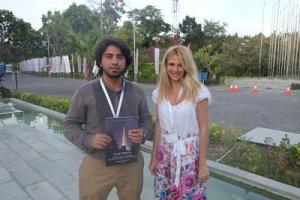By AL Publisher: APCNews Bali,
Published onPage last updated on
 After hosting the IGF last year, an international forum where activists, business and governments from all over the word meet to discuss fair governance of the internet, the situation for Azerbaijani activists who work online did not improve. In fact, as they state in a recent report, it actually became worse. APCNews talked to Gulnara Akhundova of International Media Support and Emin Huseynov from the Institute for Reporters’ Freedom and Safety about the impact of the IGF on their country one year later.
After hosting the IGF last year, an international forum where activists, business and governments from all over the word meet to discuss fair governance of the internet, the situation for Azerbaijani activists who work online did not improve. In fact, as they state in a recent report, it actually became worse. APCNews talked to Gulnara Akhundova of International Media Support and Emin Huseynov from the Institute for Reporters’ Freedom and Safety about the impact of the IGF on their country one year later.
APCNews: What was your involvement at the IGF in Baku?
Gulnara Akhundova: Before the IGF with several freedom of expression organisations formed the “Expression online Coalition,” and we prepared a report on the state of internet freedom in Azerbaijan. We had the intention to launch it during the IGF but it was not possible.
Emin Huseynov: Both the government and the organisers did the best they could to prevent us from distributing the report. There was discrimination against us as a local group. We also have asked for a booth but a representative from the Ministry of Telecommunications of Azerbaijan intervened and we couldn’t get it.
APCNews: What happened when everyone left?
EH: The situation in terms of internet freedom and other human rights got worse. Azerbaijan re-criminalised defamation online and the government continued to arrest critical voices, such as those of journalists, bloggers and other political activists.
We didn’t have any serious changes to our physical infrastructure. Yes, Azerbaijan launched its first telecommunications satellite in February 2013. But the government uses it as way to jam critical voices that we get from Turkish and other European satellites, fading the signals. And it even blocks websites. Also the government gives only very narrow channels of broadband when bloggers post videos online of opposition protest rallies; they don’t block it completely, but it’s given inadequate accessibility. Censorship happens at technical level.
GA: There is intimidation, harassment and persecution of online activists. Emin’s brother, who is a very famous blogger, social media activist and human rights defender was kidnapped and held incommunicado for seven hours, only because he posted a one-minute satellite video on the presidential election.
EH: Bloggers are arrested under fake drug criminal cases, or hooliganism cases. The government arrests a new blogger or online activist– someone, for example, that online post a satirical photo of the president– every three months and releases another, to tell people that this is what happens when they do something that they don’t like. This causes a high level of self-censorship.
APCNews: What kind of support from the international community is useful for your struggle?
EH: We need support in organising regular monitoring of internet freedom; we need specialists. We also need to build the capacity of technical people, so that we can build our own measures against blocking and ensure more privacy.
GA: We need to make sure that every user knows his or her rights when they go online. The internet is not understood as a human right in Azerbaijan but is rather recognised as mass media. And the freedom of the media and freedom of expression is recognised by the constitution.
Related reading: The struggle for internet freedom in Azerbaijan, a report from Global Information Society Watch.


